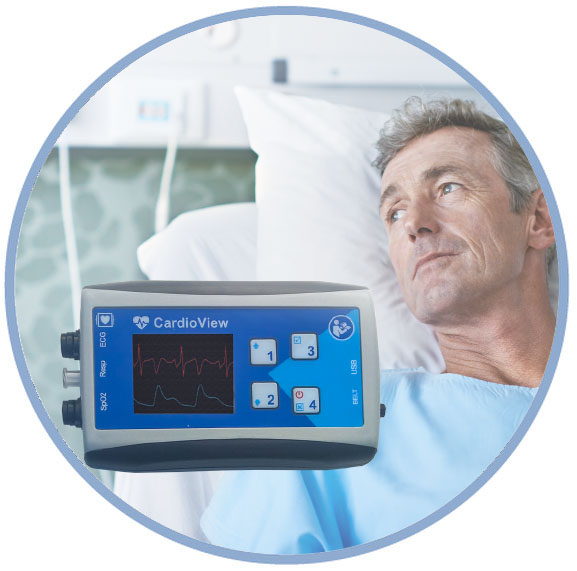- +1 800 433 4609
- |
- Request Info
- |
- Login
Patient's heart at your fingertips
Any patient can now be kept under full surveillance.
Mobile Cardiac Telemetry (MCT) – Real-Time Outpatient ECG Monitoring
A healthy person’s heart beats about 60 times per minute. And if the heart stops beating, it takes just 4 minutes before brain cells start to die from lack of oxygen. Clearly, cardiac medicine is one field in which every second counts. If a patient suffers from chest pain or heart arrhythmia, or is recovering from heart surgery, doctors need to know immediately if anything goes wrong. With BioSigns mobile Cardiac Telemetry, they can.
Mobile Cardiac Telemetry (MCT) is a form of real-time ECG monitoring in which the patient wears a device that monitors their ECG (electrocardiogram) data on an outpatient basis—24 hours a day for up to 30 days. This state-of-the-art technology represents the most reliable & efficient method to monitor a cardiac patient during the day and during sleep.
With earlier forms of monitoring, the patient would wear a device that would record all their information, then return it to the doctor or send them the information for the doctor to review. This presents an obvious problem—the time lag between a problem appearing and the doctor seeing it. MCT monitoring is unique because the technology automatically detects and transmits ECG rhythm to a remote diagnostic monitoring laboratory without any patient involvement. The diagnostic laboratory that receives the abnormal ECG activity is comprised of certified and trained personnel under the general supervision of a physician.
The technicians in the diagnostic laboratory are trained in emergency medical response and have immediate, 24-hour access to a physician to review transmitted data and make clinical decisions. The ability to respond immediately when clinically important events occur is the major advantage of real-time continuous MCT monitoring compared to other forms of Ambulatory Cardiac Monitoring.
MCT monitoring technology is an advance in care. It’s superior to other forms of Ambulatory Cardiac Monitoring (Holter or Event Monitoring) because it transmits data to doctors automatically, without the need for the patient to do anything. The need for patients to take some action to send information to their doctor creates a hurdle to care and introduces the possibility of error—with our system, this variable is removed. And medical professionals can now interact with their patients in real time, optimizing patient care almost instantly.
It’s common sense that receiving health information in real time is better than getting it days or weeks later, but the data back it up. Several studies have been performed comparing Mobile Cardiac Telemetry (MCT) to traditional 30 Day Cardiac Event Monitors. The results prove MCT to be clinically superior in detecting significant cardiac arrhythmias, successfully confirming the diagnosis whether the patient felt the symptom or not. The future for this technology is bright as it progresses to expedite & improve the quality of clinical diagnosis.
Indications of Use for Mobile Cardiac Telemetry (MCT) Monitoring
The Indications of use for Mobile Cardiac Telemetry are almost exactly the same as those for traditional Cardiac Event Monitoring, varying only slightly due to the nature of the technology. That means that for almost any patient experiencing arrhythmias or other serious problems, real-time monitoring with our Mobile Cardiac Telemetry (MCT) system is the superior choice.
As with all tests, physicians should carefully examine the indications of use for Mobile Cardiac Telemetry (MCT) (see below) before ordering a study for their patients. Although Medicare and Private Insurance company cover the diagnostic test, proper workup and indications must be met in order for it to be covered.
Indications of use for Mobile Cardiac Telemetry:
- Palpitations or undiscovered arrhythmias.
- Any symptoms that may connected with various cardiac abnormalities or arrhythmias: transient chest pain (angina), Shortness of Breath (dyspnea) signs of dizziness (syncope).
- Evidence of Bradycardia Arrhythmias.
- Bundle Branch Block or other transient non-life threatening conduction disorders.
- Post Cardiovascular surgery and/or myocardial infarction.
- Prescription drug monitoring to control Atrial Fibrillation.
- Patients recovering from cardiac surgery who are indicated for outpatient arrhythmia monitoring.
- Patients with diagnosed sleep disorders (obstructive sleep apnea) to evaluate arrhythmia behavior.
- Patients requiring arrhythmia evaluation of etiology of stroke or transient cerebral ischemia and / or stroke from atrial fibrillation or atrial flutter.
- Patients who require 24-hour monitoring for non-life threatening arrhythmias such as Supraventricular Tachycardia (Pre-mature Atrial Contractions, Atrial fibrillation, Atrial Flutter, Pre-mature Ventricular Contractions, Ventricular Tachycardia)
Mobile Cardiac Telemetry should NOT be used for patients with life-threatening arrhythmias which require in-patient monitoring or hospitalization. We recommend that you refer to the Local Coverage Determination for Medicare and refer to the guidelines for individual insurances for exact details.

